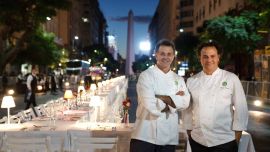Just as President Javier Milei’s approval ratings slip a bit, the talk of the town is whether former president Cristina Fernández de Kirchner is planning an electoral comeback next year – and eventually 2027.
Fernández de Kirchner’s political influence has undeniably waned over the last decade. Her diminishing clout is evident in the choices she’s made.
At the end of her second term in 2015, she backed a successor she didn’t particularly like: Peronist-turned-Libertarian Daniel Scioli. In 2019, believing her own numbers weren’t strong enough, she handpicked the semi-retired political bureaucrat Alberto Fernández to lead the Peronist ticket. In 2023, despite inflation hitting three digits, she had to settle for economy minister Sergio Massa to clinch the nomination.
None of these decisions worked out. Scioli lost, Fernández presided over a bad government, and Massa was defeated in the run-off.
Now, Milei has positioned Cristina and her political faction, Kirchnerismo, as his primary rivals for the remainder of his administration. Whether she likes it or not (and she probably does), Fernández de Kirchner is once again at the centre of Argentina’s political stage.
It’s a risky gamble for Milei and his inner circle. One can almost see the influence of political advisor Santiago Caputo, a pupil of Jaime Durán Barba — the mastermind behind the “grieta” divide that helped Mauricio Macri win the Presidency in 2015.
Macri similarly targeted the Kirchners from the start of his administration. But as the economy crumbled midway through his first and only term, this strategy only paved the way for their political resurgence.
Fernández de Kirchner thrives on being in the spotlight, but that may be part of why she hasn’t done so well politically in recent years. Over the past weeks, she has proactively stepped into the role of government opponent — a gap no-one else seems eager to fill.
Alberto Fernández made a brief attempt, but his political career effectively ended amid the scandal involving his alleged assault of the former first lady at the Olivos presidential residence. Massa is largely absent from public view, and provincial governors are preoccupied with handling Milei’s tough fiscal adjustments. Few other options remain.
The big question is whether Fernández de Kirchner wants to – or even can – lead a movement to counter Milei. At 71, she may see herself in the mirror of Brazil’s Luiz Inácio Lula da Silva, who is 78.
Lula served two terms, appointed a successor who faltered (Dilma Rousseff, impeached in 2016), faced prosecution, went to jail, and is now serving his third term in power. This week, the leftist veteran’s Brazil moved closer to investment grade, according to Moody’s.
Fernández de Kirchner is right to see some parallels between their lives. While she didn’t go to jail, she still faces several court investigations and even survived an assassination attempt in September 2022.
However, there is one crucial area where she must improve if she hopes to make a comeback: democracy.
Her detractors should also take note. Lula’s comeback was made possible by the forming of an electoral alliance with his former rival Geraldo Alckmin, who is now his vice-president. They buried their differences in 2022 to unite against Jair Bolsonaro, whom they saw as a threat to democracy. They won.
As Otto von Bismarck famously said, “politics is the art of the possible.” While it seems unthinkable (at least today) to imagine Cristina Fernández de Kirchner and Mauricio Macri joining forces on a presidential ticket in 2027, the radical, breakneck changes that Milei is introducing to Argentine politics might open the door to the unimaginable.
For instance, this week’s massive demonstration in Buenos Aires calling for increased funding for public universities brought together an unlikely coalition: Kirchnerismo, the extreme left, the centrist UCR Radicals, and former conservative Buenos Aires mayor Horacio Rodríguez Larreta. The miracles of the libertarian era.
Since the death of her husband, Néstor Kirchner, in 2010, Cristina has preferred to build her own political force rather than seek alliances with others. She gave rise to the political youth organisation La Cámpora, led by her son Máximo. However, with her sweeping re-election victory in 2011 as the exception, her political career has generally trended on a downward trajectory — whether through electoral defeats (2015, 2017, 2021, 2023) or poor governance (2019).
If she stays as she is, Kirchnerismo will be nothing but a noisy minority through the rest of Cristina’s life. A successful comeback would require an entirely new approach. Is she up to it?






















Comments